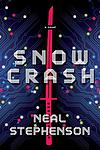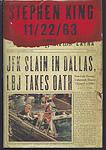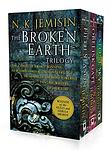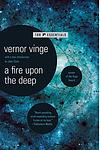The Greatest American "Science fiction, Fiction" Books Since 1990
Click to learn how this list is calculated.
This list represents a comprehensive and trusted collection of the greatest books. Developed through a specialized algorithm, it brings together 290 'best of' book lists to form a definitive guide to the world's most acclaimed books. For those interested in how these books are chosen, additional details can be found on the rankings page.
Genres
Science fiction is a genre of literature that explores the potential consequences of scientific and other innovations on society and individuals. It often features futuristic or imaginary settings, advanced technologies, and scientific concepts that are not yet fully understood or realized. Science fiction can encompass a wide range of themes, including space exploration, time travel, artificial intelligence, and alternate realities. It is a genre that allows authors to speculate on the future of humanity and the impact of scientific progress on our lives.
Countries
Date Range
Reading Statistics
Click the button below to see how many of these books you've read!
Download
If you're interested in downloading this list as a CSV file for use in a spreadsheet application, you can easily do so by clicking the button below. Please note that to ensure a manageable file size and faster download, the CSV will include details for only the first 500 books.
Download-
1. The Giver by Lois Lowry
The book is set in a seemingly perfect community without war, pain, suffering, differences or choice, where everything is under control. The protagonist is chosen to learn from an elderly man about the true pain and pleasure of the "real" world. He discovers the dark secrets behind his fragile community and struggles to handle the burden of the knowledge of pain and the concept of individuality. He must decide whether to accept the status quo or break free, risking everything.
-
2. Snow Crash by Neal Stephenson
In a future America where the federal government has largely collapsed and been replaced by corporate entities, a computer hacker and pizza delivery driver becomes embroiled in a plot involving a dangerous new drug and a computer virus called "Snow Crash". He is joined by a teenage skateboard courier and a host of other characters in a high-stakes race to uncover the truth behind the virus and its origins in ancient Sumerian culture. The narrative explores themes of linguistics, philosophy, computer science, religion, and cryptography.
-
3. The Hunger Games by Suzanne Collins
Set in a dystopian future, the novel revolves around a teenager named Katniss Everdeen, who lives in a post-apocalyptic nation where the government, in order to maintain control, forces each of its twelve districts to send a boy and girl to participate in a televised annual event. This event, known as the Hunger Games, is a fight to the death. When Katniss's younger sister is selected to participate, Katniss volunteers to take her place. The book follows her struggle for survival in the cruel game, against the backdrop of a brewing rebellion against the oppressive regime.
-
4. Jurassic Park by Michael Crichton
A billionaire entrepreneur, with the help of genetic scientists, creates a wildlife park on a secluded island filled with genetically engineered dinosaurs. When a small group of experts are invited to the park for a preview, things go awry as the security systems fail and the dinosaurs break free. The group must survive and escape the island while dealing with the dangerous prehistoric creatures and the moral implications of tampering with nature.
-
5. Cryptonomicon by Neal Stephenson
The book is a sprawling narrative that intertwines two timelines: the first during World War II, focusing on the efforts of cryptographers and mathematicians working to break Axis codes, and the second in the late 20th century, following a group of entrepreneurs and hackers establishing a data haven in Southeast Asia. The novel explores themes of cryptography, mathematics, and the history of computing, weaving together real historical figures with fictional characters. As the plot unfolds across different continents and eras, it delves into the impact of information technology on society and the perpetual conflict between governments and individuals over the control of information and privacy.
-
6. The Fifth Season by N. K. Jemisin
A woman searches for her kidnapped daughter in a world ravaged by a catastrophic climate change event known as the Fifth Season. Simultaneously, the narrative follows a young girl with destructive powers and a man struggling to control his own similar abilities. The story explores themes of oppression, survival, and the destructive power of nature, all set in a dystopian world where the earth is constantly in flux, and society is strictly divided and controlled.
-
7. The Time Traveler's Wife by Audrey Niffenegger
The novel tells the story of a man with a genetic disorder that causes him to time travel unpredictably, and his wife, an artist who has to cope with his frequent absences and dangerous experiences. Their love story endures many separations and dangerous experiences due to his condition. The story's central theme is the effects of time travel on their marriage and their passionate love for each other.
-
8. Parable Of The Sower by Octavia E. Butler
In a dystopian future where society has collapsed due to environmental and economic crises, a young woman named Lauren Olamina possesses a unique ability to feel the pain and pleasure of others. As she witnesses her community being torn apart by violence and religious fanaticism, Lauren embarks on a perilous journey to find a new safe haven and establish her own religion based on empathy and survival. Through her thought-provoking narrative, the book explores themes of resilience, spirituality, and the power of human connection in the face of adversity.
-
9. The Martian by Andy Weir
A gripping tale of survival and resilience, this book follows the story of an astronaut left stranded on Mars by his crew who believed him dead after a fierce storm. With limited supplies, he must utilize his ingenuity, wit, and spirit to survive and signal to Earth that he is alive. The narrative is a thrilling testament to human willpower and the relentless fight for survival against all odds.
-
10. Doomsday Book by Connie Willis
In this science fiction novel, a young historian undertakes a time-travel journey to the 14th century for academic research, only to find herself stranded amidst the onset of the Black Death. As she navigates the challenges of medieval England, her colleagues in the 21st century grapple with a deadly influenza pandemic, complicating efforts to retrieve her. The narrative weaves between the past and the present, exploring themes of human resilience, the universality of suffering across time, and the ethical implications of time travel, all while the historian and her contemporaries confront mortality, history, and their own personal crises.
-
11. Red Mars by Kim Stanley Robinson
The book is a science fiction narrative that chronicles the initial efforts to colonize Mars. It delves into the complex dynamics among the first group of settlers, who come from diverse cultural and scientific backgrounds, as they confront the challenges of terraforming the hostile Martian environment. The story explores themes of ecological transformation, political struggle, and the ethical implications of altering an alien world, while also examining the personal lives and evolving relationships of the colonists. As the settlers work to create a new society on the red planet, their actions set the stage for future generations and the emergence of Mars as a new frontier for humanity.
-
12. 11 22 63 by Stephen King
"11/22/63" is a science fiction novel by Stephen King that follows the story of Jake Epping, a high school English teacher who discovers a portal that leads to 1958. After being convinced by his friend Al to use the portal to prevent the assassination of John F. Kennedy, Jake embarks on a journey through time to change the course of history. Along the way, he falls in love with a woman named Sadie and faces various obstacles that threaten to alter the timeline he is trying to change. The book explores themes of love, loss, and the consequences of trying to change the past.
-
13. Parable of the Talents by Octavia E. Butler
Set in a dystopian future America ravaged by climate change and societal collapse, the novel follows the journey of a young woman who, despite facing slavery, violence, and the rise of a dangerous religious zealot, strives to build a community based on her own new belief system, Earthseed. Her vision is to create a society that can adapt and thrive amidst chaos, with the ultimate goal of taking humanity to the stars. Throughout her struggle, she documents her experiences and philosophies in the hope that they will guide future generations towards a more hopeful, resilient future.
-
14. The Broken Earth Trilogy by N. K. Jemisin
The Broken Earth Trilogy is a captivating science fiction series set in a post-apocalyptic world where a woman with the power to control seismic activity is on a quest to rescue her kidnapped daughter. This world, called the Stillness, regularly experiences catastrophic climate change events known as Seasons, which its inhabitants constantly prepare for. The series explores themes of oppression, survival, and the human capacity for adaptation, all while providing a thrilling and poignant narrative that keeps readers engaged from start to finish.
-
15. Ancillary Justice by Ann Leckie
The book is a science fiction novel that follows the story of Breq, who was once a powerful starship AI controlling many bodies, but is now trapped in a single human body and driven by a quest for vengeance. Set in a vast interstellar empire where ships and stations are inhabited by ancillary AIs, the narrative explores themes of identity, gender, and colonialism. Breq's journey intertwines with flashbacks to her past experiences as an AI, revealing her complex relationship with a former officer and the events that led to her current mission. As she navigates political intrigue and battles, Breq challenges the empire's rigid structures and seeks to address the injustices within it.
-
16. Shadow & Claw by Gene Wolfe
"Shadow & Claw" is a science fiction novel set in a distant future where the Earth's sun is dying out. The protagonist is a highly skilled torturer belonging to a guild, who is exiled for showing mercy to a prisoner. The narrative follows his journey through a world filled with strange creatures, ancient technologies, and complex political machinations. The protagonist, armed with a sword that can cut through any material, must navigate this world, dealing with love, loss, and betrayal, while also questioning the nature of his own reality.
-
17. World War Z by Max Brooks
The book is an apocalyptic horror novel presented as a collection of individual accounts in the aftermath of a global pandemic that leads to a catastrophic zombie outbreak. Through interviews with survivors from various countries and walks of life, the narrative unfolds the social, political, cultural, and environmental implications of the zombie crisis, known as World War Z. The personal stories explore the widespread panic, the collapse and resurgence of governments, military strategies employed to combat the undead, and the human resilience in the face of a decimated world. The novel serves as a critique of societal responses to disasters and a commentary on the human condition.
-
18. Ready Player One by Ernest Cline
In a dystopian future, the world has turned to a virtual reality game for solace and escape. The game's creator has passed away and left his massive fortune to the player who can solve his complex puzzles and challenges hidden within the game. The protagonist, a young, impoverished boy, becomes a contender in this high-stakes competition, battling corporate entities and other players in a race to claim the ultimate prize. As the lines between the virtual and real world blur, the protagonist must use his wits and courage to succeed.
-
19. He, She and It by Marge Piercy
The novel is a cyberpunk story set in a post-apocalyptic future where a female protagonist, a brilliant cybernetic engineer, is tasked with training a highly advanced cyborg designed for combat. As she spends time with the cyborg, she begins to see his human-like qualities and eventually falls in love with him. The narrative is interwoven with a parallel story set in 1600s Prague about a rabbi who creates a golem to protect the Jewish community. The two storylines explore themes of artificial intelligence, what it means to be human, and the ethical implications of creating life.
-
20. The Diamond Age by Neal Stephenson
Set in a future where nanotechnology has revolutionized society, the narrative revolves around a young girl named Nell who comes into possession of a powerful, interactive book called "A Young Lady's Illustrated Primer." This book, designed to educate and guide a young girl to a more enlightened state, was originally intended for an elite clientele but falls into Nell's hands by chance. As Nell uses the primer to navigate her complex, cyberpunk world, the story explores themes of education, social class, and the impact of technology on society. The book weaves together the lives of various characters across different strata of a stratified culture, examining how access to technology can both empower and divide.
-
21. Darwin's Radio by Greg Bear
In the science fiction novel, a groundbreaking discovery of ancient human remains leads to the uncovering of a new, heretofore unseen stage of human evolution. Scientists grapple with the implications of a dormant virus that has suddenly awakened within human DNA, causing rapid, radical, and uncontrolled genetic mutations. As the virus spreads, society is thrown into chaos, with fear and uncertainty about the future of humanity. The protagonists, a molecular biologist and a paleontologist, race against time to understand the virus, known as "Darwin's Radio," and its potential to either doom or elevate the human race. Their journey is fraught with personal and professional challenges as they confront the possibility that evolution might be a much more active and immediate force than anyone had ever imagined.
-
22. Saga Vol. 1 by Brian K. Vaughan
In a war-torn galaxy, two soldiers from opposite sides fall in love and have a child, igniting a dangerous pursuit by various factions who seek to control the child's extraordinary powers. With a mix of fantasy, science fiction, and romance, "Saga Vol. 1" takes readers on a thrilling and visually stunning journey through a vast and imaginative universe.
-
23. Against the Day by Thomas Pynchon
The novel is a sprawling epic that spans the period from the 1893 World's Fair to the years following World War I. It follows the stories of several characters including the anarchist Traverse family, a group of balloonists, a detective, and a mathematician. The book explores themes of anarchism, capitalism, and technology, and incorporates elements of science fiction, adventure, and historical fiction. It is noted for its complex structure and dense, multifaceted narrative.
-
24. How To Live Safely In A Science Fictional Universe by Charles Yu
In this metafictional novel, a time machine repairman, trapped in a time loop, searches for his father and the meaning of his existence within a universe that operates on science fiction tropes. As he navigates a landscape filled with paradoxes, dog-eared pages of his life, and a self-aware narrative, he confronts his past and the nature of reality itself. The book blends emotional depth with quantum mechanics, exploring themes of family, memory, and the passage of time, all while breaking the fourth wall and challenging the conventions of storytelling.
-
25. A Fire Upon the Deep by Vernor Vinge
In this science fiction epic, a human expedition inadvertently unleashes a malevolent superintelligence in the far reaches of the galaxy. As the entity spreads destruction across civilizations, a diverse group of characters, including a family stranded on a planet with a medieval-level society of dog-like aliens, must navigate complex political landscapes and the vast scales of a universe with zones of thought that dictate the level of technological and cognitive potential. The novel intertwines multiple narratives, exploring themes of consciousness, technology, and communication, while a desperate race against time unfolds to stop the spreading menace before it can reach the High Beyond, where even more advanced societies are vulnerable to its insatiable hunger for power and control.
Reading Statistics
Click the button below to see how many of these books you've read!
Download
If you're interested in downloading this list as a CSV file for use in a spreadsheet application, you can easily do so by clicking the button below. Please note that to ensure a manageable file size and faster download, the CSV will include details for only the first 500 books.
Download























